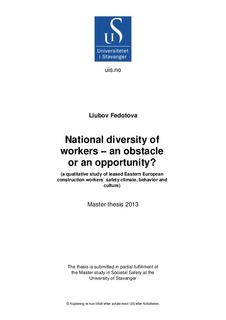| dc.description.abstract | Background and research problem: building and construction is a dangerous branch of industry. Norwegian Working Environment authority discovered that leased Eastern European construction workers are injured at work more often than the others. Safety culture is said to be connected to accident occurrence. The quality of safety culture among a certain group of workers can be revealed through the quality of safety climate and safety behavior patterns, determined by perceived management practices. National diversity of workforce can affect safety climate and behavior, and thus the quality of safety culture. In this respect it is the task of management to perform high-quality diversity management. The aim of this study is therefore to research what impact the way Norwegian management treats leased Eastern European construction workers (as perceived by the latters) has on the quality of safety culture among them.
Method: the study is designed as a qualitative one, based first of all on 14 in-depth interviews with leased Eastern European construction workers in Norway. Moreover, Fafo report (2007:3) as a tertiary source of data, as well as relevant legal acts are analyzed in order to confirm/refute and explain some findings.
Results: the workers don`t perceive Norwegian management being as committed to safety as to the needs of production: the migrants are sometimes made work in unsafe conditions, under time-pressure. The communication between migrant workers and Norwegian management and colleagues is poorly developed. These practices are strongly associated with national belonging of workers and determine substandard safety climate among migrants: they perceive discrimination, language barrier, separation, level of trust is very low, perception of injustice – high. Such safety climate leads to the low level of organizational commitment and participative behavior, and high amount of silent deviations. As a result safety culture among leased Eastern Europeans cannot be called either informed, or learning, or reporting, or flexible, or just, or balancing production and protection.
Conclusion: the fact that Norwegian management is not perceived to perform high-quality diversity management leads to substandard quality of safety culture among leased migrants. The workers` perceptions are fully consistent with the conclusions made in Fafo report. The management does not seem to acknowledge that diversity can be an opportunity for learning and creativity if appropriately managed. Moreover, legal requirements aggravate the situation, putting a great deal of responsibility for leased migrants on their direct employer, often not competent in HSE issues, instead of making responsible the companies in which the workers risk their lives every day. | no_NO |
